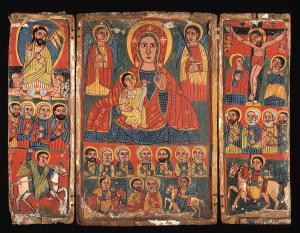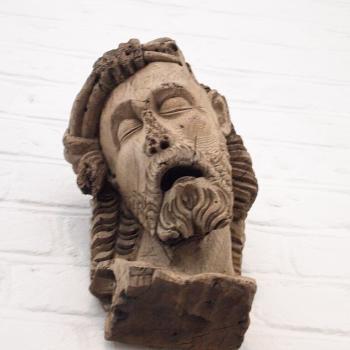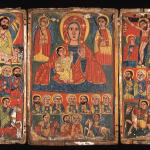
Holiness, wherever it is found, reveals some aspect of the glory of the kingdom of God; this is why the saints, insofar as they are holy (for we know they are sinners like the rest of us), serve as extraordinary representatives of the kingdom of God to the world. Saints were men and women of their times; they were not perfect, nor should we expect them to have been perfect. In their thoughts and deeds, we can see the influences of their society, including its errors, upon them; but, because of the penetration of the kingdom of God in their lives, because of grace, they have a transcendent element in them which allows them to be witnesses of the kingdom of God to all ages. While there are criticisms one can make of many of Leonardo Boff’s writings, criticisms which show how he is a man of his time, he caught a glimpse of the kingdom of God as it is revealed in and through the saints, like Saint Francis, and was able to articulate it in a very compelling manner:
Whenever the saints, in their following Christ, plumb the depths of human existence, there appears the perennial truth of the Gospel. They break the boundaries of their times and become contemporaries of every time and every person in search of their star. And because of this, they are neither ancient nor modern; they are simply true, always true, carriers of that truth that captures the crucial questions of existence in every age, as well as the very truth of Christ. [1]
The saints do not merely seek to understand the human condition, nor do they merely point out the problems of their society; they take the charism given to them and use it to engage their concerns. They know that the solution lies with their cooperation with God and God’s grace. They will do what they can to reveal the glory of the kingdom of God, to share whatever holiness they have attained with others, so that the world at large can be made better. But, as Boff points out, one of the reasons why saints are able to do this is that they first took the battle within, they first confronted their own internal demons, or at least some of them, and in doing so, were able to be victorious:
Within every great saint there lives a great demon. The roof of sanctity are born in the depths of human frailty. Virtues are great because temptations are conquered were great. One is not nursed on sanctity like mother’s milk during infancy. Behind the saint is hidden a person who has conquered the hells of human nature and the crush of sin, despair, and the denial of God. [2]
This shows us that such victories are possible, that we should never give up when we confront our own demons.
In proportion to the way they engaged the kingdom of God and participated in it, insofar as holiness is found in them, the saints found that what began in their temporal journey continues with them in eternal life. The good that they have established, the love which they have formed, makes sure that in their heavenly experience, they do not abandon their concerns for the world. They continue to look after and take care of us by sharing what they have been given with us, and the rest of the world, which is why they can be relied upon as our friends and fellow workers with Christ: “Neither will it be unsuitable if we should say that all the saints who have departed this life, still having charity towards those who are in this world, are concerned for their salvation and help them with their prayers and intercessions with God.”[3]
The saints desire what God desires, that is, they want holiness to spread throughout the world, allowing all in it to participate in and experience the kingdom of God for themselves. The holier a saint is, that is, the more they have opened themselves to and engaged the kingdom of God in what they think and do, the more they will become focal points of graces, graces which they do not try to keep to themselves but share with others:
It is transmitted by the fathers that, at the moment when the saints are caught up by the divine bidding to be raised to that blessed state as a result of encountering our Lord whose power attracts them <to himself>, like a magnet that draws in to itself flakes of iron, then all the legions of the heavenly hosts, and the choirs of the descendants of Adam, will be gathered together as a single Church. And then the goal of the Creator’s intention will be fulfilled, <a goal> towards which he had been looking since the beginning of the world’s coming into being, <from the time> when he was creating the created world in grace. It is to this outcome that he has been looking during the entire drawn-out course of this world, with its distinctive features, <a world> that, with its changes, was serving rational beings, as its lord. But in the courts of the kingdom they will henceforth find delight, in the world that has no end or alteration in the enjoyment of its life. [4]
Outside of the church there is no salvation because all are called to become a part of and join in the church, to find themselves a part of Christ’s body in the eschaton. The resurrection reverses the division and dissolution of creation which began with the fall. Christ is the New Adam, and in him, all people, indeed, all things can be brought together, healed from the wounds of sin, and made better than before. Those who are united with him find they participate in and experience the divine life, a participation which allows them to be deified without end. There is no end to the glory of God, no end to the potential found within the divine life, and no end to the enjoyment which is to come – eternity is not going to be boring, it is not going to be riddled with sorrows, as all that led for such will be put behind us. The saints prefigure this, as they, in their holiness, have a joy which is palpable, a spiritual beauty which attracts us, and the more we find ourselves intertwined with them, the more we will find our calling is to be a saint along with them, experiencing the kingdom with them.
[1] Leonardo Boff, Saint Francis. Trans. John W. Diercksmeier (New York: Crossroad, 1989), 1.
[2] Leonardo Boff, Saint Francis, 131.
[3] Origen, “The Song of Songs: Commentary” in Origen: The Song of Songs, Commentary And Homilies. Trans. R.P. Lawson (New York: Newman Press, 1956), 194.
[4] St. Isaac of Nineveh, Headings on Spiritual Knowledge (The Second Part, Chapters 1-3). Trans. Sebastian Brock (Yonkers, NY: St Vladimir’s Seminary Press, 2022), 84 [Chapter 3; First Discourse].
Stay in touch! Like A Little Bit of Nothing on Facebook.
If you liked what you read, please consider sharing it with your friends and family!
N.B.: While I read comments to moderate them, I rarely respond to them. If I don’t respond to your comment directly, don’t assume I am unthankful for it. I appreciate it. But I want readers to feel free to ask questions, and hopefully, dialogue with each other. I have shared what I wanted to say, though some responses will get a brief reply by me, or, if I find it interesting and something I can engage fully, as the foundation for another post. I have had many posts inspired or improved upon thanks to my readers.











